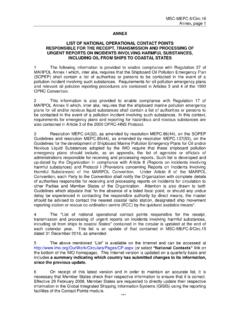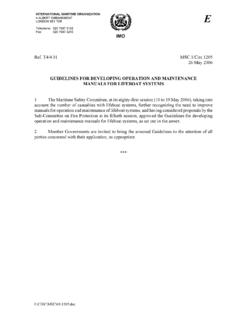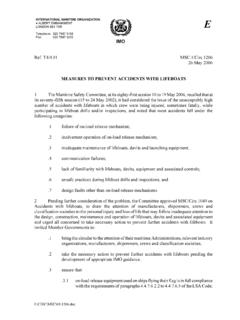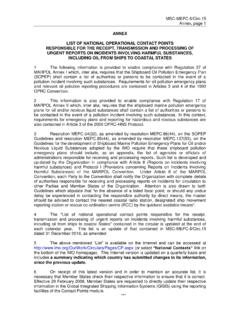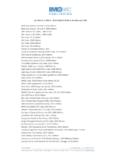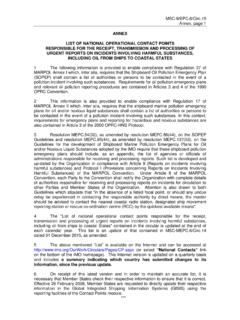Transcription of Sustainable and Quality Manpower Supply for Shipping ...
1 1 Sustainable and Quality Manpower Supply for Shipping industry : System Approach Submitted by The International Association of Maritime Universities (IAMU) on 22 December 2015, In response to Circular Letter No. 3574 on 14 August 2015, Request for input on Trends, Developments and Challenges for IMO s strategic framework for 2018-2032 1. Short description of the overall topic We live in a global society, which is supported by a global economy and that economy simply could not function if it were not for ships and the Shipping industry . Shipping is truly the lynchpin of the global economy: without Shipping , intercontinental trade, the bulk transport of raw materials and the import/export of affordable food and manufactured goods would simply not be possible1.
2 It is generally accepted that more than 90 per cent of global trade is carried by sea and that is why Quality Manpower Supply is the most important factor driving sustainability in maritime transport. The world fleet grew by per cent during the 12 months to 1 January 20152, but the current shortage of officer corps seafarers is forecast to worsen and risks impacting carrier profitability, according to Drewry s recently published Manning 2014 Annual Report3. A shortage of competent seafarers, particularly officers, to operate the increasingly sophisticated vessels is a challenge for the industry ; high- Quality engineering officers will be particularly in demand as tighter emission regulations require ships to burn lighter fuels in sophisticated new engine designs4.
3 The highest priority of the international Shipping industry remains the safety of life at sea. It is anticipated that the Sustainable development goals developed by IMO also address issues such as seafarer training, further improvements to navigational safety and the promotion of an effective safety culture5. It is also common knowledge that 75-96% of marine casualties are caused by some form of human error. Therefore, there is a direct cause and effect relationship between the competence of seafarers through Quality MET and successful and environmentally responsible Globalization6.
4 1 International Shipping Facts and Figures Information Resources on Trade, Safety, Security, Environment; IMO, Maritime Knowledge Centre 6 March 2012. 2 UNCTAD Review of Maritime Transport 2015. 3 4 Seminar on CSR activities for the Shipping industry , Speech by Koji Sekimizu, Secretary-General, International Maritime Organization, 26 April 2012, Singapore; 5 Sustainable Development IMO World Maritime Day 2013, INTERNATIONAL CHAMBER OF Shipping (ICS). 6 2015 2 Many dangerous Shipping practices originate from substandard MET, which results in substandard skill levels of Officers and Crew.
5 Consequently, such Human Factor issues are highly correlated to conditions of industry Safety, Security and Environment Protection levels7. It is also reasonable to take into account that Globalization stimulates growth in the international trade and that increased International Shipping itself is one of the major factors in this process. The building of newer and more technically sophisticated ships and port systems to meet this increased demand for seaborne trade, along with new IMO requirements for regulating safety, security, protection of environment, will demand, more than ever, well trained and educated personnel both on board and ashore.
6 Viewed in this light, it is easy to see why Sustainable development needs a Sustainable maritime transportation system and why Sustainable Shipping needs Sustainable and Quality Manpower Supply . It is recognized that human resources and human element are of utmost importance for development of the Sustainable maritime transportation system. It is also understood that such industry challenges as reduced ship manning, crew fatigue, crew overload, overregulation, administrative burden, and the attraction of young people to the industry are tightly related to Quality of human resources.
7 Taking into account the IMO Secretary-General s statement at the 2015 International MET Symposium at WMU, Effective standards of training remain the bedrock of a safe and secure Shipping industry , which needs to preserve the Quality , practical skills and competence of qualified human resources8 , IAMU proposes the following topic for IMO 2018-2023 Strategic Direction: Sustainable and Quality Manpower Supply for Shipping industry : System Approach . 2. Narrative of the trends and developments Practically all Manpower surveys carried out in the 21st century are still predicting the shortages of properly qualified ship officers; this is something the stakeholders cannot afford to ignore.
8 In accordance with BIMCO / ISF Manpower Update, the Supply / Demand Balance in 2000 estimated a worldwide shortfall of 16,000 officers or 4 % of the total workforce9. In 2005 the estimates indicated a modest theoretical worldwide shortfall of 10,000 officers or 2 % of the total workforce10. The results in 2010 suggest that the situation is one of approximate balance between demand and Supply for ratings with a modest overall shortage of officers (about 2%); the implication being there is currently not a serious shortage problem for officers in aggregate.
9 This does not, of course, mean that individual Shipping companies are not experiencing serious recruitment problems, but simply that overall Supply and demand are currently more or less in balance. This is perhaps not surprising given the sharp contraction in the demand for sea transport in 2009 combined with significant growth in total seafarer 7 Creating Common Worldwide MET Excellence, Joint Vision Statement of the Tripartite Round Table Forum convened by the IAMU jointly with representatives of Maritime Administrations and the Shipping industry , Saint Petersburg, 21st of September 2009.
10 8 Joint Resolution of the Conference and Tripartite Round Table Forum convened by the Ministry of Transport of the Russian Federation jointly with Admiral Makarov SUMIS and Representatives of MET Institutions, Maritime Administrations and the Shipping industry , International Practical-Research Conference MET: Trends & Challenges in the XXI Century , Saint Petersburg, 2015. 9 BIMCO / ISF Manpower 2000 UPDATE, The worldwide demand for and Supply of seafarers, 2000. 10 BIMCO / ISF Manpower 2005 UPDATE, The worldwide demand for and Supply of seafarers, 2005.
